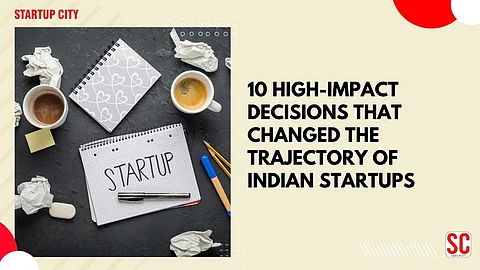

“In the middle of difficulty lies opportunity.”
Albert Einstein
Let me ask you something: Have you ever made a decision that felt small at the time but ended up transforming everything?
In the Indian startup world, such decisions are everywhere. Over the last decade, the Indian startup ecosystem has witnessed monumental shifts—some sparked by sheer instinct, others by relentless grit. But in every story of unicorns and breakout brands, there’s one thing in common: a high-impact decision that changed the game.
Today, I’m taking you behind the scenes of 10 such bold decisions that shaped not just companies—but entire industries. If you’re a founder, investor, or startup dreamer, consider this your roadmap.
In a country where credit card penetration was low and trust in online payments was even lower, Flipkart’s move to offer COD changed the rules of e-commerce in India.
Flipkart understood Indian consumer behavior better than most. People wanted to see the product before they paid. This single move not only increased conversions but also paved the way for mass adoption of e-commerce.
“We didn’t just sell products—we sold trust.” – Sachin Bansal, Co-founder, Flipkart
When Paytm started focusing on digital wallets in 2014, it felt like a niche play. But when demonetization hit in 2016, Paytm was ready.
It scaled from 125 million users to over 400 million in a matter of months. Timing? Perfect. Vision? Priceless.
Zomato’s decision to acquire international food discovery platforms (like Urbanspoon in the US) looked risky—but it gave the company global exposure, data, and a diversified revenue model.
Don’t be afraid to look beyond borders—as long as your core product can travel well.
In my experience, the best startup decisions aren’t reactive—they’re proactive. BYJU’S bet big on animated video learning way before most of us realized EdTech was going to explode.
This long-term investment in content quality made BYJU’S the go-to platform during the pandemic, when schools shut down and digital education became the norm.
Initially, OYO worked as a hotel aggregator. But when quality and consistency became a challenge, they made a high-stakes pivot to a fully controlled franchise model.
This allowed them to standardize offerings, improve customer trust, and scale globally—fast.
“Standardization is not boring—it’s scalable.” – Ritesh Agarwal, Founder, OYO
When Freshworks (originally Freshdesk) moved to Silicon Valley, it wasn’t abandoning India—it was upgrading its growth trajectory.
It gave them access to enterprise clients, better valuation, and global investor visibility—all while maintaining its Indian engineering backbone.
At a time when burn rates were considered a badge of honor, Nykaa chose the road less traveled: sustainable growth with profitability at its core.
This model gave Nykaa investor confidence and a smooth IPO—setting it apart from several loss-making unicorns.
While everyone chased big merchants, Razorpay quietly focused on creating clean, developer-friendly APIs for payment gateways.
They built trust with India’s growing tech founder community, and word-of-mouth did the rest. Today, Razorpay powers over 8 million businesses.
Fantasy sports? In India? In 2012, that idea seemed laughable to many. But Dream11 stuck to its conviction, navigated legal grey zones, and defined an entirely new industry.
Dream11 is valued at over $8 billion and has inspired dozens of gaming and sports-tech startups.
When most startups chase funding rounds, Zoho made the rare choice to stay bootstrapped—and it paid off.
By avoiding VC pressure, Zoho built a solid product suite, served over 100 million users, and became a symbol of independent, sustainable growth.
“We don’t run on investor money. We run on customer trust.” – Sridhar Vembu, Founder, Zoho Corp
Timing is everything—but so is preparation.
Customer trust wins over product flashiness.
Bold pivots can be painful, but powerful.
Bootstrapping isn’t a weakness—it can be a superpower.
Each of these high-impact decisions wasn’t just a strategic move—it was a belief in something bigger. And that belief changed the course of their companies.
Let me ask you this:
What’s one bold decision you’ve been holding back on—because of fear, funding, or failure?
Remember, every success story begins with a leap. So whether you're building your MVP, planning expansion, or rethinking your strategy, ask yourself: Is this decision going to move the needle?
Because you could be writing the next chapter in India's startup revolution.
Revisit your current roadmap—are you thinking long-term or just surviving month to month?
Study these startups—and learn not just what they did, but why.
Don’t copy—adapt. The best decisions are made in context.
You’re not alone if you’ve struggled with decision paralysis—it happens to the best of us. But if there’s one takeaway from these 10 startup stories, it’s this:
Big impact starts with bold intent.
So go ahead—trust your gut, back it with data, and take that leap.
India’s next big startup success? It could be you.